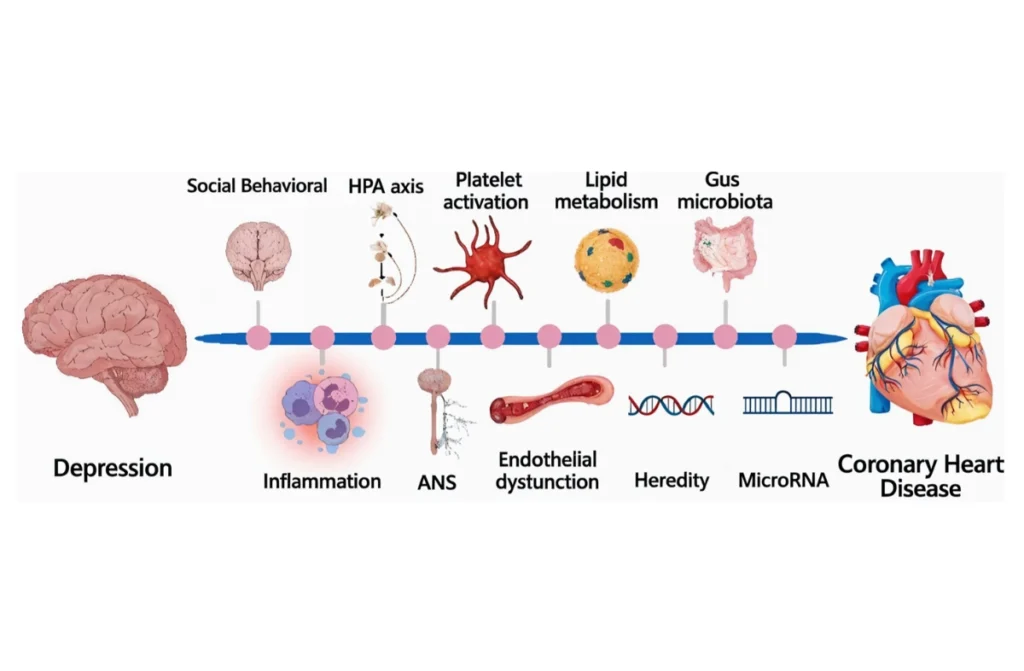Chronic stress, depression and heart disease are the most common and challenging health conditions people face today. Depression and heart disease are often interrelated and can profoundly impact a person’s physical and mental health. This post will explore the connection between these three conditions and the importance of early diagnosis and treatment.
Chronic Stress
Chronic stress is a state of prolonged mental and emotional stress that can result from various life events, including work-related stress, financial worries, relationship issues, and health problems. Chronic stress can have a negative impact on the body, leading to physical and psychological health problems, including heart disease.
Depression
Depression is a mental health condition characterized by persistent feelings of sadness, hopelessness, and low self-esteem. Depression can be caused by a combination of genetic, environmental, and psychological factors and can impact the body in various ways. In addition to causing physical symptoms, depression can also increase the risk of heart disease.

Link between Stress, Depression and Heart Risks
The connection between chronic stress, depression and heart disease is complex and multi-faceted. Chronic stress and depression both affect the body in various ways, leading to an increased risk of heart disease.
Chronic stress triggers the release of stress hormones, such as cortisol, which can cause inflammation, increase blood pressure, and disrupt the functioning of the heart. Depression and heart disease, on the other hand, has been linked to unhealthy lifestyle choices, such as lack of exercise, smoking, and poor diet, which can contribute to the development of heart disease.
Stress, Depression, Heart Impact
The impact of chronic stress, depression, and heart disease on overall health and well-being cannot be overstated. These conditions can profoundly impact a person’s physical and mental health, leading to a reduced quality of life and increased risk of future health problems. In some cases, the impact of these conditions can be so severe that they can lead to disability or even death.
Treatment and Management
Treatment and management of chronic stress, depression and heart disease are crucial for reducing the risk of further health problems and improving overall health and well-being. Therapy, exercise, and healthy lifestyle choices can play an important role in managing these conditions.
Additionally, seeking treatment and support from a healthcare professional like the top cardiologist in Chennai Dr. M. Kathiresan working at MK Heart Clinic can help to reduce the risk of heart disease and improve the quality of life for those affected by chronic stress, depression, and heart disease.
Signs of Depression
- Persistent Sadness: Feeling consistently sad, hopeless, or having a general sense of emptiness.
- Loss of Interest: Losing interest or pleasure in once enjoyable activities.
- Fatigue: Experiencing unexplained fatigue or a lack of energy.
- Changes in Sleep: Disturbed sleep patterns, including insomnia or oversleeping.
- Appetite Changes: Significant changes in appetite, leading to weight loss or gain.
- Difficulty Concentrating: Struggling with focus, memory, or decision-making.
- Physical Symptoms: Experiencing unexplained aches, pains, or digestive issues.
- Suicidal Thoughts: Thoughts of self-harm or suicide, which require immediate professional help.
- Connection with Heart Disease: Depression and heart disease often share a bidirectional relationship. Depression can contribute to heart disease, and heart disease can exacerbate depressive symptoms.
It’s essential to address both conditions for comprehensive well-being. Seek professional help if you recognize these signs or if you have a history of heart disease.
Depressed Heart Function
Depressed heart function refers to a condition where the heart’s efficiency in pumping blood is impaired. This can occur due to several factors, such as coronary artery disease, heart failure, or myocardial infarction (heart attack). However, one crucial factor that is often overlooked in heart disease is the psychological state of an individual. Depression can worsen the heart’s function in various ways:
- Increased Stress Response: Depression activates the body’s stress response, causing the release of stress hormones like cortisol and adrenaline. These hormones increase heart rate and blood pressure, putting unnecessary strain on the heart and blood vessels. Over time, this can lead to significant damage and impaired heart function, contributing to conditions like high blood pressure and atherosclerosis. For individuals suffering from heart disease, this can complicate their recovery and increase the risk of further complications.
- Increased Inflammation: Depression has been shown to elevate inflammatory markers in the body, which contribute to the development and progression of heart disease. Chronic inflammation leads to the accumulation of plaque in the arteries, causing narrowing and restricting blood flow to the heart—a condition known as atherosclerosis. Elevated inflammation levels exacerbate existing heart conditions and may lead to further depressed heart function.
- Unhealthy Lifestyle Choices: Depression can lead to a lack of motivation to engage in healthy habits like regular exercise, maintaining a balanced diet, and managing stress. These unhealthy behaviors can worsen underlying heart conditions. Individuals with depression may struggle to stick to heart-healthy lifestyle changes, which are essential for managing cardiovascular health and improving depressed heart function.
- Impact on Heart Rate Variability (HRV): Studies have shown that depression lowers heart rate variability (HRV), a key indicator of heart health. Low HRV is associated with an increased risk of heart disease, including heart attacks, and poorer outcomes for individuals with existing cardiovascular conditions. Monitoring HRV is essential for understanding the full scope of an individual’s heart health and preventing complications.
To manage both mental health and heart health, it is vital to seek the expertise of the best cardiologists in Chennai. A skilled cardiologist can assess heart function, provide the necessary interventions, and guide patients toward treatment plans that address both the heart’s physical condition and the psychological impact of depression.
Psychological Impact of a Heart Attack
A heart attack is a life-changing event, and its psychological impact can be profound. Many individuals experience an emotional toll after surviving a heart attack, which can significantly affect their recovery process. Heart attack survivors often experience heightened feelings of anxiety, fear, depression, and in some cases, post-traumatic stress disorder (PTSD). These emotional responses are not only detrimental to mental health but can also have adverse effects on heart health, potentially hindering recovery.
- Post-Heart Attack Depression (PHAD): Post-heart attack depression (PHAD) is a condition commonly experienced by survivors. Studies indicate that individuals with PHAD are at a higher risk of developing further heart-related issues, including another heart attack. Depression following a heart attack can reduce a person’s motivation to maintain a heart-healthy lifestyle, affecting their recovery. Poor adherence to medications and reduced physical activity can further impair cardiovascular health.
- Anxiety and Fear of Another Heart Attack: After experiencing a heart attack, many individuals develop a constant fear of having another one. This anxiety can increase stress levels, which further complicates the recovery process. The fear of another heart attack may limit physical activity and cause individuals to avoid activities that contribute to cardiovascular well-being, ultimately leading to a decrease in overall quality of life and an increase in the risk of additional heart problems.
- Impact on Rehabilitation: Depression and anxiety following a heart attack can severely affect an individual’s ability to engage in rehabilitation. Heart attack survivors may find it difficult to participate in physical therapy or make necessary lifestyle changes due to emotional distress. This lack of engagement can delay recovery and increase the risk of complications, leading to prolonged recovery times and poorer health outcomes.
It is essential for individuals recovering from a heart attack to receive both psychological and cardiovascular care. The top cardiologists in Chennai understand the need for an integrated approach that combines physical heart care with mental health support. By addressing both aspects of recovery, patients can improve their chances of making a full recovery and reduce the risk of further cardiovascular issues.
Depression and Heart Disease Link
- Stress Hormones – Depression raises stress hormones, leading to increased blood pressure and heart disease risk.
- Lifestyle Impact – Depression often leads to poor lifestyle choices such as smoking, inactivity, and unhealthy eating, further increasing heart disease risks.
- Chronic Inflammation – Depression triggers inflammation, a key factor in heart disease development.
- Poor Heart Health Worsens Mood – Heart disease symptoms like fatigue can worsen depression.
The link between depression and heart disease is crucial, which is why seeking the top cardiologist in Chennai for holistic care is vital.
Heart Attack’s Psychological Impact
A heart attack profoundly affects emotional well-being. Patients often experience heightened anxiety, fear of recurrence, and depressive symptoms. This psychological stress can hinder recovery and impact adherence to treatment. Addressing these mental health effects is crucial, as ongoing depression may elevate the risk of additional heart complications. Access to counseling and support from the top cardiologist in Chennai can significantly improve both mental and cardiac health outcomes, fostering a holistic approach to recovery.
Positive Mental State and Heart Disease
- Lower Stress Levels – A positive mindset helps reduce stress, a known trigger for heart disease.
- Improved Heart Function – Positivity has been linked to lower blood pressure and healthier heart rates.
- Healthier Choices – Positive mental health encourages a more active lifestyle and healthier eating habits.
- Stronger Immune System – A good mood boosts the immune system, aiding in heart disease prevention.
Maintaining a positive attitude can counteract the effects of depression and heart disease. The best cardiologists in Chennai recommend mental well-being as part of heart care.
Treating Depression
- Therapy – Cognitive Behavioral Therapy (CBT) is effective in treating depression and its impact on heart health.
- Medications – Antidepressants may help, but heart health should be monitored.
- Physical Activity – Regular exercise improves both mental health and heart function.
- Social Support – Connecting with family and friends helps in reducing depression symptoms.
Treating depression and heart disease simultaneously is essential for overall well-being. Consulting the best cardiologists in Chennai ensures both physical and mental health are addressed effectively.
Conclusion
Chronic stress, depression and heart disease are complex and challenging health conditions that can profoundly impact a person’s physical and mental health. Understanding the connection between these conditions is crucial for reducing the risk of further health problems and improving overall health and well-being. By seeking treatment and support from the best cardiologists in Chennai from Dr. M. Kathiresan who can make your life healthy, can reduce the risk of heart disease, and improve the quality of your life.
Read also: Angioplasty treatment in Chennai

